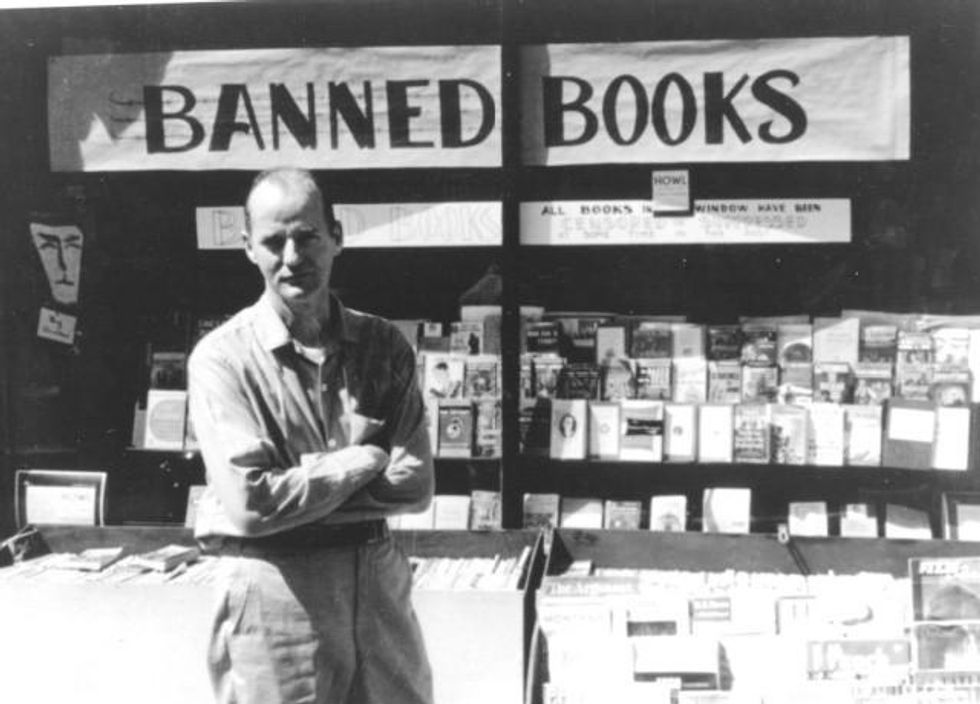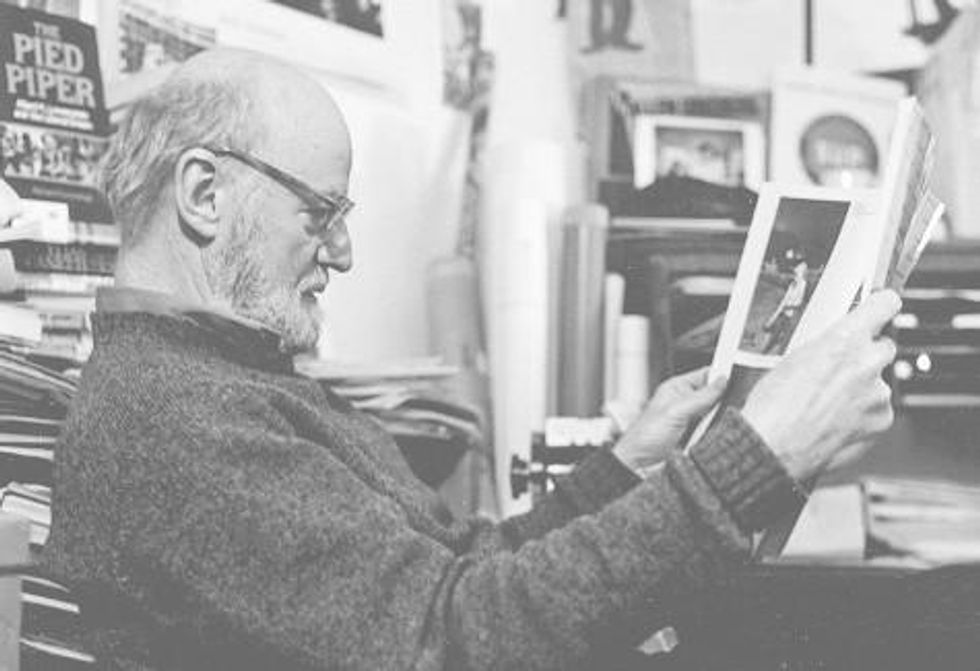

SUBSCRIBE TO OUR FREE NEWSLETTER
Daily news & progressive opinion—funded by the people, not the corporations—delivered straight to your inbox.
5
#000000
#FFFFFF
To donate by check, phone, or other method, see our More Ways to Give page.


Daily news & progressive opinion—funded by the people, not the corporations—delivered straight to your inbox.
We bid fond farewell to Lawrence Ferlinghetti, tireless poet, publisher, painter, iconoclast, activist, "heart of the Beat generation" and "legend of American letters, bookselling, rabble rousing, wild dreaming" who co-founded San Francisco's iconic City Lights bookstore and became a hometown icon himself. He died at 101 after a lifetime of extolling poetry as "insurgent art" while "awaiting/ perpetually and forever/ a renaissance of wonder." One fan: "My condolences to the world."

In later decades, Ferlinghetti remained active at City Lights and became a hometown avatar: "He was San Francisco. He will always be San Francisco." The city named a street after him, appointed him their first Poet Laureate, and to mark his centennial declared March 24, his birthday, Lawrence Ferlinghetti Day, with month-long events. On his 100th birthday he also published his final book, Little Boy, an autobiographical stream-of- consciousness novel; his publisher wanted to call it a "memoir," but Ferlinghetti found the term too "genteel." In recent years, he was nearly blind and could no longer bike and walk around his city, but he retained a busy life. At 99, he was described in an interview with The Paris Review as "still unbent, and all attempts to persuade him to adopt a cane have been rebuffed"; despite his fame, he remained "deficient in any aggrandized sense of self." As news of his death came, New Directions, his publisher for over 60 years, declared, "May we all live so long and so well." He was celebrated as "eternal hero, liberator of the amusement park mind, the quiet bookstore clerk as 1-man molotov." Many thanked him for "bringing the Beat poets and other great writers up to the surface," for introducing them to "unreality" and "a life" and poetry itself. "You're just on another road now," read one goodbye. "Say hi to Allen, Jack and Neal." The most apt farewells were, somehow, the most succinct: "Bummer...My condolences to the world....Rest in poetry." Yes.
From Ferlinghetti's The World Is A Beautiful Place
The world is a beautiful place
to be born into
if you dont mind happiness
not always being
so very much fun
if you dont mind a touch of hell
now and then
just when everything is fine
because even in heaven
they dont sing
all the time
The world is a beautiful place
to be born into
if you don't mind some people dying
all the time
or maybe only starving
some of the time
which isn't half so bad
if it isn't you

Dear Common Dreams reader, The U.S. is on a fast track to authoritarianism like nothing I've ever seen. Meanwhile, corporate news outlets are utterly capitulating to Trump, twisting their coverage to avoid drawing his ire while lining up to stuff cash in his pockets. That's why I believe that Common Dreams is doing the best and most consequential reporting that we've ever done. Our small but mighty team is a progressive reporting powerhouse, covering the news every day that the corporate media never will. Our mission has always been simple: To inform. To inspire. And to ignite change for the common good. Now here's the key piece that I want all our readers to understand: None of this would be possible without your financial support. That's not just some fundraising cliche. It's the absolute and literal truth. We don't accept corporate advertising and never will. We don't have a paywall because we don't think people should be blocked from critical news based on their ability to pay. Everything we do is funded by the donations of readers like you. Will you donate now to help power the nonprofit, independent reporting of Common Dreams? Thank you for being a vital member of our community. Together, we can keep independent journalism alive when it’s needed most. - Craig Brown, Co-founder |

In later decades, Ferlinghetti remained active at City Lights and became a hometown avatar: "He was San Francisco. He will always be San Francisco." The city named a street after him, appointed him their first Poet Laureate, and to mark his centennial declared March 24, his birthday, Lawrence Ferlinghetti Day, with month-long events. On his 100th birthday he also published his final book, Little Boy, an autobiographical stream-of- consciousness novel; his publisher wanted to call it a "memoir," but Ferlinghetti found the term too "genteel." In recent years, he was nearly blind and could no longer bike and walk around his city, but he retained a busy life. At 99, he was described in an interview with The Paris Review as "still unbent, and all attempts to persuade him to adopt a cane have been rebuffed"; despite his fame, he remained "deficient in any aggrandized sense of self." As news of his death came, New Directions, his publisher for over 60 years, declared, "May we all live so long and so well." He was celebrated as "eternal hero, liberator of the amusement park mind, the quiet bookstore clerk as 1-man molotov." Many thanked him for "bringing the Beat poets and other great writers up to the surface," for introducing them to "unreality" and "a life" and poetry itself. "You're just on another road now," read one goodbye. "Say hi to Allen, Jack and Neal." The most apt farewells were, somehow, the most succinct: "Bummer...My condolences to the world....Rest in poetry." Yes.
From Ferlinghetti's The World Is A Beautiful Place
The world is a beautiful place
to be born into
if you dont mind happiness
not always being
so very much fun
if you dont mind a touch of hell
now and then
just when everything is fine
because even in heaven
they dont sing
all the time
The world is a beautiful place
to be born into
if you don't mind some people dying
all the time
or maybe only starving
some of the time
which isn't half so bad
if it isn't you


In later decades, Ferlinghetti remained active at City Lights and became a hometown avatar: "He was San Francisco. He will always be San Francisco." The city named a street after him, appointed him their first Poet Laureate, and to mark his centennial declared March 24, his birthday, Lawrence Ferlinghetti Day, with month-long events. On his 100th birthday he also published his final book, Little Boy, an autobiographical stream-of- consciousness novel; his publisher wanted to call it a "memoir," but Ferlinghetti found the term too "genteel." In recent years, he was nearly blind and could no longer bike and walk around his city, but he retained a busy life. At 99, he was described in an interview with The Paris Review as "still unbent, and all attempts to persuade him to adopt a cane have been rebuffed"; despite his fame, he remained "deficient in any aggrandized sense of self." As news of his death came, New Directions, his publisher for over 60 years, declared, "May we all live so long and so well." He was celebrated as "eternal hero, liberator of the amusement park mind, the quiet bookstore clerk as 1-man molotov." Many thanked him for "bringing the Beat poets and other great writers up to the surface," for introducing them to "unreality" and "a life" and poetry itself. "You're just on another road now," read one goodbye. "Say hi to Allen, Jack and Neal." The most apt farewells were, somehow, the most succinct: "Bummer...My condolences to the world....Rest in poetry." Yes.
From Ferlinghetti's The World Is A Beautiful Place
The world is a beautiful place
to be born into
if you dont mind happiness
not always being
so very much fun
if you dont mind a touch of hell
now and then
just when everything is fine
because even in heaven
they dont sing
all the time
The world is a beautiful place
to be born into
if you don't mind some people dying
all the time
or maybe only starving
some of the time
which isn't half so bad
if it isn't you
